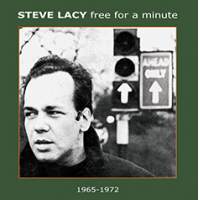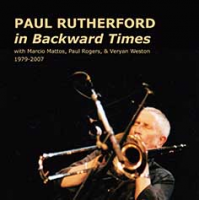Home » Jazz Articles » Multiple Reviews » Emanem Releases New Music From Late, Great Heroes Lacy A...
Emanem Releases New Music From Late, Great Heroes Lacy And Rutherford
 Steve Lacy
Steve Lacy Free for a Minute (1965-72)
Emanem
2017
As the dates in its title indicate, Free for a Minute covers a seven-year period out of Steve Lacy's long career, the earliest recordings here dating from December 1965 and the latest from March 1972. Throughout these years the saxophonist's playing was predominantly free improvisation, coinciding with his move from NYC to Europe in the spring of 1965. Free for a Minute opens with the transitional album Disposability, recorded with bassist Kent Carter and drummer Aldo Romano in Rome, which mixed four Lacy pieces with compositions by his former collaborators Monk, Cecil Taylor and Carla Bley.
Compared to past issues of that album, the sound is vastly improved, particularly a badly-recorded cymbal which blighted past issues. Lacy's playing still carries traces of his time playing Monk (as heard on the 2014 Emanem reissue of School Days) but he sounds on the brink of complete freedom, notably on the completely improvised "There We Were." Another album, Sortie, recorded less than two months later, in Milan, adds Enrico Rava on trumpet to the trio. Although the quartet were still playing Lacy compositions, their music was noticeably freer than on Disposability, partly due to the presence of Rava and his interactions with Lacy—thrilling stuff.
Jumping forward to July 1967 in New York, we come onto previously unissued music; a quintet of Lacy, Rava and Carter plus Karl Berger on vibes and piano, and Paul Motian on drums, recorded thirteen "cues" for a never-released film entitled Free Fall (nothing to do with Jimmy Giuffre, by the way). Varying in length from thirty-five seconds up to five-and-a-half minutes, they run for sixteen minutes in total; titles such as "Lisa in the Air," "Dinner" and "Death Scene" hint that the music was intended for particular, and contrasting, scenes. Consequently, while each one has its own atmosphere and merits, they were never intended to be heard together as a suite. Along the way, there are plenty of typical Lacy passages to set the pulse racing and justify the release of this music.
Finally, from 1972—towards the end of this free period—come two previously unreleased tracks, recorded in Paris with Lacy's group of the time—Carter on bass, Steve Potts on alto, Irene Aebi on cello and Noel McGhie on drum set. The tracks "The Rush" and "The Thing," the latter separated into two parts, are Lacy compositions (identifiable as such, like many others, by their two-word titles starting with the definite article) from the time when he was profusely writing material. Despite that, they both fit neatly into Free for a Minute as they are not through-composed but include substantial freely improvised sections, during some of which the main themes seem to be completely forgotten, particularly when Lacy and Potts both take flight and trade phrases. A fitting end to an inspiring album.
 Paul Rutherford
Paul Rutherford In Backward Times
Emanem
2017
With such essential releases as the 1975 solo album The Gentle Harm of the Bourgeoisie 1975) and the 1996 Rutherford-Rogers duo Rogues, Emanem has been the most important label in establishing Paul Rutherford's reputation as an improvising trombonist without equal. Despite releasing a host of fine Rutherford albums, when going through the Emanem archives the label's proprietor, Martin Davidson, came across four concert recordings that he describes as some of the best music he had heard in ages... hence, this album. Unlike the Lacy album, In Backward Times consists entirely of previously unreleased music, over seventy-five minutes' worth.
Dating from 2004, 1979, 1988 and 2007, respectively, and featuring Rutherford solo on trombone, on trombone & electronics, in a trombone and bass duo, and in a trombone-piano-cello trio, the music presents a rich and varied portrait of him that is powerful evidence of his pre-eminence. In all four contexts, he displays characteristic restraint and sensitivity, consistently producing sounds that are engaging and amusing, often both simultaneously. Solo, with or without electronics, he managed to construct dialogues with himself that invariably draw the listener in. In groups with others, be they duos or trios, he never seemed to hog the limelight but was a generous collaborator; nonetheless, time and again, it is the humanity of his playing that captures listeners' attention.
Altogether, In Backward Times is an extraordinary album, as fine as any other Rutherford release. It is also very poignant. The inner sleeve features a black-and-white photograph of a group of six Royal Air Force musicians on national service in Germany in 1960; on one side stands John Stevens, holding a drum, and on the other stands Rutherford, trombone in hand; the two met in the RAF and, after national service, were instrumental in the birth of free improv in sixties London. In complete contrast, the 2007 trombone-piano-cello trio that closes this album features the very last notes that Rutherford played in public; three months later he died. This album re-emphasises the magnitude of that loss (see video below).
Tracks and Personnel
Free for a Minute (1965-72)
Tracks: Shuffle Boil; Barble; Chary; Tune 2; Pannonica; M's Transport; Coming on the Hudson; There We Were; Generous 1; Cue 15 part 2; Cue 16 unannounced; Cue 17 Lisa in the Air; undecipherable jump; Cue 23 Lisa Lies on Bed; Cue 24 Jump montage; Cue 25 Jump montage continues; Cue 29 Dinner; Cue 30 End of Lisa's First Jump; unannounced cue; Cue 7 Bedroom part 3; Cue 9 Frank Fellows; Cue 12 Death Scene; Sortie; Black Elk; Helmy; Fork New York; Living T Blues; 2-Fou; The Rush; The Thing part 1; The Thing part 2.
Personnel: Steve Lacy: soprano saxophone; Kent Carter: double bass; Aldo Romano: drum set (1-9, 23-28); Enrico Rava: trumpet (10-28); Karl Berger: vibraphone, piano (10-22); Paul Motian: drum set (10-22); Steve Potts: alto saxophone (29-31); Irene Aebi: cello (29-31); Noel McGhie: drum set (29-31).
In Backward Times
Tracks: Duet for One; Duet for Two; Solo for One; Trio Finale.
Personnel: Paul Rutherford: trombone (1-4), electronics (1); Paul Rogers: double bass (2); Veryan Weston: piano (4); Marcio Mattos: cello & electronics (4).
< Previous
Mark Guiliana: A Natural Progression ...
Next >
Bringin' It
Comments
Tags
For the Love of Jazz
 All About Jazz has been a pillar of jazz since 1995, championing it as an art form and, more importantly, supporting the musicians who create it. Our enduring commitment has made "AAJ" one of the most culturally important websites of its kind, read by hundreds of thousands of fans, musicians and industry figures every month.
All About Jazz has been a pillar of jazz since 1995, championing it as an art form and, more importantly, supporting the musicians who create it. Our enduring commitment has made "AAJ" one of the most culturally important websites of its kind, read by hundreds of thousands of fans, musicians and industry figures every month.


















